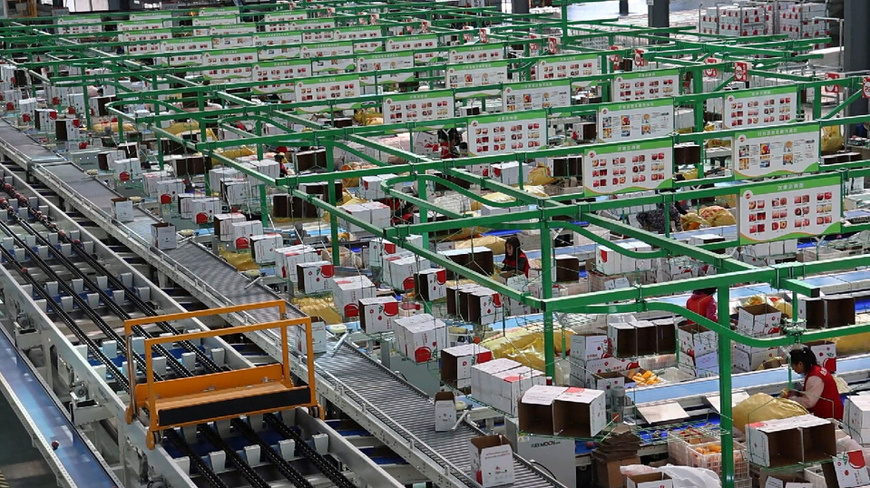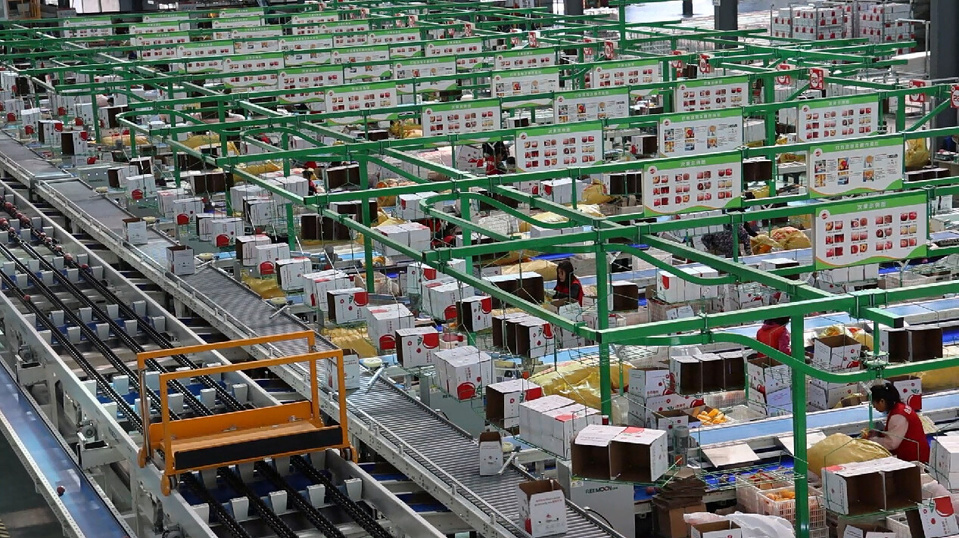By Zhang Tie, People's Daily

Apples are packed on a production line of a fruit company in Luochuan county, northwest China's Shaanxi province. (Photo by Li Jin)
In Luochuan county, Yan'an, northwest China's Shaanxi province, apples are a common sight. Apple stores line the streets and alleys; trucks carrying loads of apples zip along urban and rural roads; in industrial parks, apples are processed into crisps, juices, and pectin. Across the Loess Plateau, vast apple orchards extend as far as the eye can see.
Apple cultivation in Yan'an began in the 1940s. Today, Luochuan boasts 530,000 mu (about 35,333 hectares) of apple orchards, producing over 1.1 million tons of apples annually. An impressive 95 percent of local farmers are engaged in the apple industry, which accounts for 95 percent of residents' income.
Luochuan's success story vividly illustrates that agriculture can be a thriving "green industry," a "prosperity industry" driving poverty alleviation and rural revitalization, as well as an advanced, modern, and promising "sunrise industry."
The growth of the industry hinges on quality seeds. In Luochuan's apple germplasm resource nursery, rows of apple trees stand neatly aligned. Even in winter, some trees still bear fruit.
"This is part of a fruit drop experiment," said Zhang Junqi, deputy county mayor responsible for apple cultivation. The nursery houses over 4,000 apple germplasm genes and 600 premium new apple varieties. Continuous breeding of new varieties upgrades this "gene bank" into an "Apple Silicon Valley." The highly popular "Qin Cui" apple, for example, was crossbred there.
In the past, there was a saying in Luochuan: the orthopedic hospital was an "auxiliary industry" to apple farming. Why? Because the tall apple trees were difficult to manage, and farmers often got injured climbing up and down.
In recent years, Luochuan has accelerated orchard modernization by optimizing varieties and adopting dwarf and densely planted trees. Apple trees now grow to about three meters in height and are planted in orderly rows. Hail nets, sprinkler systems, and pest control boards are uniformly installed, and the mechanization rate in orchards has risen from less than 20 percent to over 70 percent. With standardized planting and intensive production, orchard output and income have both doubled.
The apple industry park in Luochuan hosts 52 large enterprises and 356 small and micro businesses. Covering apple trading, cold storage, smart logistics, deep processing, and production of agricultural supplies, the park has established a comprehensive industrial ecosystem.
In the park, there is an intelligent apple sorting line which can take 72 photos of an apple in just one second, enabling automatic grading and sorting. In a carton production plant, corrugated paper is cut and folded into various packaging boxes. At a logistics distribution center, an average of 20,000 boxes of apples move rapidly along conveyor belts daily. Through integrated apple-livestock farming, 10 organic fertilizer processing plants in the park produce 250,000 tons of organic fertilizer annually.
The facts speak for themselves: strengthening one industry can drive an entire value chain, and focusing on one core sector can lead to diverse growth opportunities.
By continuously innovating varieties and maintaining strict quality control, Luochuan apples have enhanced their reputation in the market.
A combination of early, mid, and late-maturing varieties allows for a staggered harvest throughout the growing season, while 1,710 cold storage facilities support staggered supply, ensuring Luochuan apples are available year-round. This approach increases their market visibility.
Meanwhile, a three-tier logistics system spanning counties, townships, and villages ensures that apples are "on the road as soon as they leave the tree." With faster delivery times, Luochuan apples have boosted customer satisfaction. The "Luochuan apple" has become a renowned brand with a value now exceeding 88.32 billion yuan ($12.10 billion).
Today, Luochuan apples are sold worldwide and have even been sent into space, with an annual output value exceeding 14 billion yuan. With unlocked agricultural new quality productive forces and a modern apple industry system, Luochuan apples are experiencing high-quality development. They remain a symbol of prosperity for farmers, a source of happiness for the people, a driver of county growth, and a key player in rural vitalization.
Apple cultivation in Yan'an began in the 1940s. Today, Luochuan boasts 530,000 mu (about 35,333 hectares) of apple orchards, producing over 1.1 million tons of apples annually. An impressive 95 percent of local farmers are engaged in the apple industry, which accounts for 95 percent of residents' income.
Luochuan's success story vividly illustrates that agriculture can be a thriving "green industry," a "prosperity industry" driving poverty alleviation and rural revitalization, as well as an advanced, modern, and promising "sunrise industry."
The growth of the industry hinges on quality seeds. In Luochuan's apple germplasm resource nursery, rows of apple trees stand neatly aligned. Even in winter, some trees still bear fruit.
"This is part of a fruit drop experiment," said Zhang Junqi, deputy county mayor responsible for apple cultivation. The nursery houses over 4,000 apple germplasm genes and 600 premium new apple varieties. Continuous breeding of new varieties upgrades this "gene bank" into an "Apple Silicon Valley." The highly popular "Qin Cui" apple, for example, was crossbred there.
In the past, there was a saying in Luochuan: the orthopedic hospital was an "auxiliary industry" to apple farming. Why? Because the tall apple trees were difficult to manage, and farmers often got injured climbing up and down.
In recent years, Luochuan has accelerated orchard modernization by optimizing varieties and adopting dwarf and densely planted trees. Apple trees now grow to about three meters in height and are planted in orderly rows. Hail nets, sprinkler systems, and pest control boards are uniformly installed, and the mechanization rate in orchards has risen from less than 20 percent to over 70 percent. With standardized planting and intensive production, orchard output and income have both doubled.
The apple industry park in Luochuan hosts 52 large enterprises and 356 small and micro businesses. Covering apple trading, cold storage, smart logistics, deep processing, and production of agricultural supplies, the park has established a comprehensive industrial ecosystem.
In the park, there is an intelligent apple sorting line which can take 72 photos of an apple in just one second, enabling automatic grading and sorting. In a carton production plant, corrugated paper is cut and folded into various packaging boxes. At a logistics distribution center, an average of 20,000 boxes of apples move rapidly along conveyor belts daily. Through integrated apple-livestock farming, 10 organic fertilizer processing plants in the park produce 250,000 tons of organic fertilizer annually.
The facts speak for themselves: strengthening one industry can drive an entire value chain, and focusing on one core sector can lead to diverse growth opportunities.
By continuously innovating varieties and maintaining strict quality control, Luochuan apples have enhanced their reputation in the market.
A combination of early, mid, and late-maturing varieties allows for a staggered harvest throughout the growing season, while 1,710 cold storage facilities support staggered supply, ensuring Luochuan apples are available year-round. This approach increases their market visibility.
Meanwhile, a three-tier logistics system spanning counties, townships, and villages ensures that apples are "on the road as soon as they leave the tree." With faster delivery times, Luochuan apples have boosted customer satisfaction. The "Luochuan apple" has become a renowned brand with a value now exceeding 88.32 billion yuan ($12.10 billion).
Today, Luochuan apples are sold worldwide and have even been sent into space, with an annual output value exceeding 14 billion yuan. With unlocked agricultural new quality productive forces and a modern apple industry system, Luochuan apples are experiencing high-quality development. They remain a symbol of prosperity for farmers, a source of happiness for the people, a driver of county growth, and a key player in rural vitalization.
 Menu
Menu
 Luochuan apples: a Fruitful path to prosperity
Luochuan apples: a Fruitful path to prosperity
















